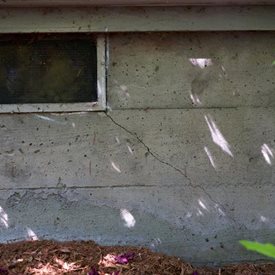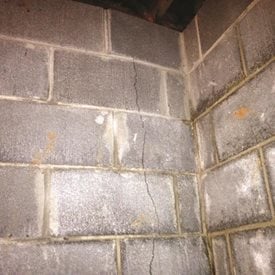- Foundation Repair Home
- Foundation Repair Cost: What are the variables?
- Does Insurance Cover Foundation Repair?
- Foundation Cracks
- Methods of Repair
- Piering: Fixing your home's issues
- Slabjacking: What is slabjacking?
- Related Information:
- Concrete repair: Repair methods and troubleshooting basics
- Read more about foundation information on FoundationRepairNetwork.com
- Houston Foundation Issues: Answers to common questions about foundation problems in Houston
Section Sponsor
Foundation Repair Near Me
Foundation Cracks: What’s Normal & How to Fix Them
How serious are the cracks in your concrete foundation and when should you worry?
Some foundation cracks are normal, while others may be a sign of serious structural problems. Photo: RamJack.
Cracks in a home’s concrete foundation can be difficult to diagnose and costly to repair. Here are answers to the most common questions.
Are foundation cracks normal?
Yes, and they usually are no reason to panic. In fact, most cracks in a poured concrete foundation are a natural result of foundation settlement and shrinkage of the concrete during the curing process and can be easily fixed or simply left alone. But if the cracks are abnormally large or allowing seepage to enter the home, they are often a sign of a more serious structural problem.
Find RamJack foundation repair contractors near me.
What causes foundation cracks?
Here are a number of factors that can lead to cracks in concrete foundations, so determining the cause is not always clear-cut. Often a combination of issues are at play. (See Why Does Concrete Crack?):
- Shrinkage – This may happen shortly after a house is built. If the poured concrete foundation dries too quickly, it can shrink and cause hairline cracking.
- Settlement – Foundations can also crack due to settlement or movement. This is often due to soil beneath the foundation sinking or shifting. All foundations will settle with time, but little damage is done if the foundation settles uniformly as a whole. However, serious cracking can occur when this settlement is uneven (also called differential settlement).
- Weather extremes – Weather extremes lead to variations in soil moisture, causing the soil surrounding your foundation walls to shrink or swell. In the summer, during periods of dry weather, the soil will shrink away from foundation walls. In the winter, when water in oversaturated soil freezes, it expands, causing the soil to exert pressure on foundation walls. These repeated cycles of soil expansion and contraction put foundations under a lot of stress that can eventually lead to cracking.
- Expansive soils – Expansive soils, which are common in certain regions of the country, have high contents of absorptive clay and swell when they get wet, increasing in volume of 10% or more. That’s enough pressure to crack concrete foundation walls and floor slabs and even cause foundation movement. See How Expansive Soils Can Lead to Foundation Problems.
How serious are foundation cracks?
The direction and width of a foundation crack will often tell you whether it’s a cause for concern. Fortunately, many cracks are mostly aesthetic in nature and may need nothing more than a cosmetic repair if you find them to be an eyesore. Of the foundation cracks you are likely to encounter, vertical cracks are the least troublesome and usually the result of normal foundation settlement. However, if your cracks run diagonally or horizontally through the wall or if you have large cracks (wider than 1/8 inch), they are often due to differential settlement or soil pressure and may be signs of more serious structural problems in need of extensive repair. See these warning signs of foundation damage.
Do all cracks leak?
Any crack that goes all the way through a foundation wall has the potential to leak if the conditions are right. If you have multiple cracks, some will provide less resistance to water than others and are likely to leak first. You can take preventive measures to help protect from water intrusion, such as using downspout extensions and regrading the soil to direct rainwater away from the foundation. However, if a crack leaks once, it will probably leak again until the crack is sealed.
What are the best methods for fixing foundation cracks?
The easiest and most effective way to repair a vertical wall crack is by injecting an epoxy or polyurethane sealant into the crack that will permanently seal it and stop the flow of water from the outside. You repair diagonal cracks in much the same way. However, it may take more material to prevent future movement. Also, because diagonal cracks are often due to differential settlement, it’s important to determine where the settlement is located and to take measures to prevent settlement there in the future.
If your foundation has multiple cracks, you may be tempted to fix only those that are actively leaking. However, it’s worth the expense to have all cracks repaired at once to eliminate the risk of new leaking cracks.
Learn more: Can You Live in Your Home During Foundation Repair?
Can cracks be repaired if the basement is finished?
If your basement walls are covered by paneling or drywall that you are reluctant to remove, it’s often possible for a foundation repair contractor to seal a crack from the outside using sodium bentonite, a granular clay that forms an impermeable barrier on the wall exterior. Bentonite, a material commonly used in foundation waterproofing panels, can absorb a tremendous amount of water, swelling at least 15 times its original volume to push itself into cracks and voids. Once the crack is located, a small hole is dug down to the bottom of the footing and then filled with the clay powder. The dry bentonite absorbs water from the soil, which causes it to expand. The entire process can be completed in a matter of hours with minimal disruption to your exterior landscaping.
How much will crack repair cost?
It all depends on the work being done. Smaller jobs involving the sealing of one or two cracks may only be a few hundred dollars. Larger jobs involving extensive crack repair and structural remediation can run into the thousands of dollars. Be sure to get an estimate from several reputable foundation repair contractors before making a decision.
Although most insurance policies won’t pay for foundation crack repair caused by soil expansion and contraction or poor construction (see Will Your Homeowner’s Insurance Cover Foundation Repair?) not fixing the problem can result in even more damage and an unhealthy living environment, especially if the cracks are leaking. Remember that when it comes time to sell your home, you are legally obligated to disclose whether you are aware of any basement seepage problems. Leaving the cracks unfixed will typically result in a lower sales price.
Can I make the repairs myself?
Possibly, if the crack is minor and the repair is purely for aesthetic reasons. However, a small foundation crack can become larger over time, so it's important to contact a professional with a trained eye to assess the problem and determine the cause. The repair of serious cracks are best left to an expert, who will know the best repair materials and procedures to use.





